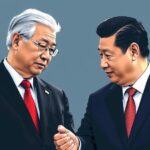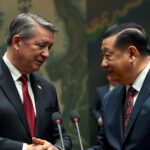Politics
ASIA, BEIJING, BILATERAL RELATIONS, CHINA, ECONOMIC COOPERATION, EUROPE, EUROPE/ASIA, FOREIGN POLICY, GEOPOLITICS, GLOBAL SOUTH, INDIA, INDO - PACIFIC, MEXICO, MODI, NATIONAL INTELLIGENCE, NEW DELHI, NORTH AMERICA, QUINCY INSTITUTE, RUSSIA, SARANG SHIRODE, STRATEGIC PARTNERSHIP, SUB, SUBRAHMANYAM JAISHANKAR, TU, UNITED STATES, US, WASHINGTON
Omar El-Sharif
US-India Relations May Strengthen Under Trump, Targeting China
Following Donald Trump’s electoral win, India is expected to strengthen its relations with the U.S. as both nations focus on countering China’s influence in the Indo-Pacific. Key cabinet nominees advocate for enhanced collaboration with India, potentially prioritizing bilateral agreements while deprioritizing human rights issues that characterized the previous administration. Analysts suggest that this new alignment may provide India with an advantageous position in negotiations.
In the wake of Donald Trump’s recent electoral victory, India appears poised to strengthen its ties with the United States, particularly concerning strategies aimed at countering China’s influence in the Indo-Pacific region. Indian Foreign Minister Subrahmanyam Jaishankar expressed his confidence that India would successfully navigate the foreign policy dynamics of the incoming Trump administration, which some analysts assess will favor New Delhi over Beijing. The strategic appointments announced by President Trump, including Senator Marco Rubio as US Secretary of State and former Representative Tulsi Gabbard as Director of National Intelligence, reflect a greater emphasis on reinforcing relations with India. These officials have advocated for a robust partnership with India as an essential element in the U.S. strategy against China’s expansive reach. Although some experts maintain that Trump’s “America First” doctrine may pose challenges for collaboration on technological and trade fronts, the prevailing sentiment is that India may achieve a more advantageous position in negotiations compared to China. Moreover, the shift in the new administration’s focus is expected to deprioritize concerns related to human rights and India’s rapport with Russia, which were emphasized during President Biden’s term. Sarang Shirode, director of the Global South program at the Quincy Institute, noted, “It turns out that the overall mix is very favorable to India,” highlighting the proactive stances of Trump’s cabinet nominees regarding U.S.-India relations. As such, analysts predict a potential recalibration of U.S. foreign policy that prioritizes strategic alliances with countries like India, marking a notable departure from previous administrations’ frameworks that emphasized multifaceted diplomatic engagement across various issues. This reflects a broader trend of U.S. realignment in the Indo-Pacific, targeting China’s influence in the region and redefining the U.S.-India partnership towards a more favorable axis.
The article discusses the implications of Donald Trump’s electoral victory on U.S.-India relations, particularly in the context of countering China’s influence. With key appointments advocating for stronger ties with India, the article highlights the shift in U.S. foreign policy priorities that may benefit India. It explores how this shift could impact various bilateral engagements, trade partnerships, and the overall geopolitical landscape in the Indo-Pacific region.
In conclusion, the anticipated foreign policy direction under a second Trump administration suggests a significant shift towards strengthening U.S.-India relations, particularly against the backdrop of countering China. The appointments of pro-India figures within the administration may indeed facilitate more favorable negotiations for India. Ultimately, as the geopolitical landscape evolves, this may mark a new chapter in the U.S.-India partnership, supported by a robust framework aimed at addressing shared concerns in the Indo-Pacific.
Original Source: www.scmp.com








Post Comment